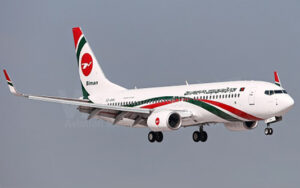• Little-known SSR code, DPNA 1, can be used to alert airlines when a traveler has an intellectual or developmental disability and needs assistance
• Many airlines offer support to meet passengers’ individual needs once alerted via the SSR code
• Use of the code on flights booked through Travelport has increased 89% since the launch of its Travel Unified campaign, with the use up 273% in Asia and 22% in Oceania
• Travelport has now extended the campaign until at least the end of 2019 and called for all parties in the travel industry to do more to support people with intellectual disabilitiesLangley, United Kingdom. Friday 27 September 2019: Requests for assistance for airline passengers with intellectual disabilities have nearly doubled since the launch of a global campaign by travel technology company, Travelport, designed to raise awareness of a dedicated Special Service Request (SSR) booking code.
SSR codes are used in the airline industry to communicate traveler preferences or needs to airlines. They are delivered through standardized four-letter codes defined by the International Air Transport Association (IATA).
The DPNA SSR code can be used by travel agents, among others, to alert airlines when a passenger has intellectual or developmental disability and needs assistance. Many airlines, as well as airports and hotel groups, have initiatives in place to meet travelers’ individual needs if they are made aware at the time of booking that they require additional support.
Travelport launched its Travel Unified campaign in March 2019 after it found evidence of exceptionally low use of the code on bookings made through its global distribution system (GDS)2. A poll of travel agents and conversations with nonprofit organizations confirmed this was due a lack of awareness.
Since the launch of Travel Unified, use of the DPNA SSR code on flights booked through Travelport3 have increased globally by 89% year-on-year. At a regional level, use of the code on flights is now up 273% in Asia, 259% in Africa, 94% in Europe and 22% in Oceania. Use remains low in both North and South America.
As part of its campaign to raise awareness of the DPNA SSR code, Travelport has shared educational ‘sign-on alerts’ and graphical ‘prompts’ more than 10 million times with hundreds of thousands of travel agents across the world through Travelport Smartpoint, its flagship Point of Sale solution that is used by travel agents, among others, to search and book airline seats, hotel rooms and more. The digital media used to reach travel agents is typically sold by Travelport to travel providers, like airlines and hotels, as advertising space.
In addition, Emirati vlogger, Khalid Al Ameri, documented his family’s positive experience traveling from the United Arab Emirates to Bahrain on a flight with Etihad Airways, with the DPNA SSR code applied to the booking of his son, who is on the autism spectrum. Since the video went live on Al Ameri’s Facebook page on World Autism Day, it has been viewed more than 6 million times, shared more than 100,000 times and received more than 10,000 messages of support.
Fiona Shanley, Chief Customer and Marketing Officer at Travelport, said: “Our purpose as a company is to build leading technology that makes the experience of buying and managing travel continually better for everyone, so raising awareness of the support available for travelers with different needs is something we all are passionate about. We’re encouraged by the results we’ve seen so far and our decision to extend Travel Unified until at least the end of 2019 should enable us to reach even more travelers and travel agents. We’d like to call on all airlines, airports, hotels and other members of the travel family to do more to ensure everyone has the travel experience they deserve, including the 200 million people worldwide with intellectual disabilities.”
Linda Ristagno, External Affairs Manager at IATA, said: “Air travel is an integral means of transport in today’s world and all those with disabilities – visible or not – should have access to safe, reliable and dignified travel. With the approval of the IATA AGM Resolution in June, our airline members committed to improve the air travel experience for the estimated one billion people living with disabilities worldwide.
The Travel Unified awareness campaign is an excellent example of a company taking a leadership role in this space, and a reminder of how the travel experience can be improved for passengers through a simple 4-digit code. The correct use of DPNA provides airlines with the relevant information that they need to support passengers with intellectual disabilities. We encourage the travel industry to continue to raise awareness of the code and for passengers with disabilities to know that they are always welcome on board.”




